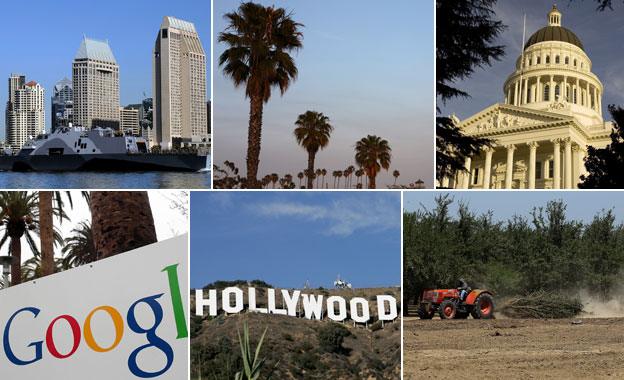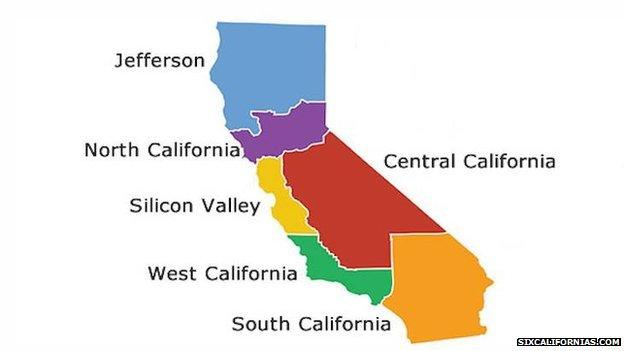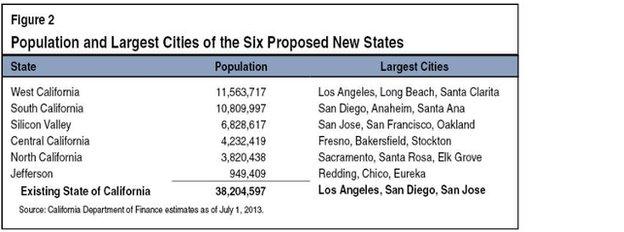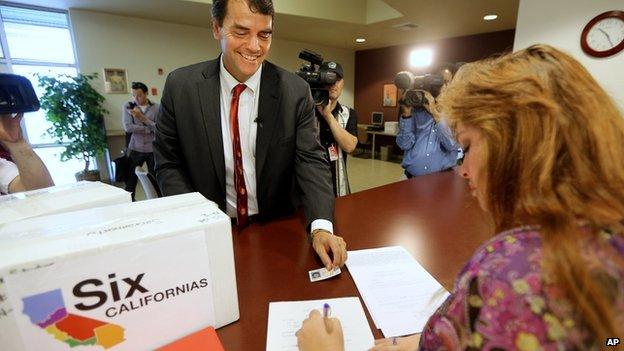A man with a plan for six Californias
- Published
- comments

California's not all sun-drenched beaches
Everyone loves California. The state has given us dancing raisins, the Beach Boys and mass-produced Sriracha sauce. So why stop at one California when you can have six?
So goes the thinking of Silicon Valley millionaire Timothy Draper, who announced, external on Monday that he has collected enough signatures to place his "Six Californias" initiative on the 2016 November election ballot.
Over the past few months, Mr Draper has spent, external over $2m (£1.17m) of his own money to promote the bill, hoping to convince enough voters to make his secessionist dream a reality.
Should the drive succeed, California would be broken up into six new states, each with its own governor, legislature, congressional representation and votes in the electoral college to determine the US president. Mr Draper would then become a resident of the state of Silicon Valley, which would become the wealthiest in the nation.
The plan has a long way to go before becoming a reality. If Mr Draper has indeed collected enough signatures and the measure passes in November 2016, an approval by the US Congress would still be necessary. Then the complex, contentious break-up process begins in earnest.
Although Mr Draper says, external that his plan is a way to give a fresh start to the various regions of the state, "from a new crowd-sourced state flower to a more relevant constitution", many critics feel that the tech baron has more selfish motivations.

The six new California states, as proposed by Timothy Draper
"This entire plan is really about creating Silicon Valley as its own state," writes, external Philip Bump for the Washington Post. "Therefore Silicon Valley gets to be a state called 'Silicon Valley', and it gets to make its politics and its money more dense, and everyone in the idyllic dream of Silicon Valley gets to be happy. And have two senators."
Along with its own representation, Silicon Valley's tax dollars would likely be reinvested within its borders, rather than directed to the financially lagging regions around it.
"A state of Silicon Valley - home to Google, Facebook and Apple - would be an economic dynamo freed from meddling legislators in Sacramento and liberated from sharing its immense wealth with poorer parts of the old, unified California," writes, external David Horsey for the Los Angeles Times.

"It's emblematic of the feeling that many of the 'tech-ers' have - if they didn't have to deal with the rest of the bozos in the world, the world would be a better place," Stanford political scientist Bruce Cain tells the BBC.
Though this proposal may have stemmed from a sense of regional privilege, it would not have been possible without California's initiative system that favours the wealthy.
"In California, there are endless numbers of people with a lot of money who can launch personal crusades, and the initiative system gives them the perfect opportunity to exercise their whims," Mr Cain says. "This is also a story about how ironically the initiative system has become the instrument of plutocracy."
But segregating California's tech goldmine may not bode well for the other newly created states.
"The plan's most dramatic implications would be for wealth distribution and inequality," writes, external Andrew Prokop for Vox.
Although Silicon Valley would become the wealthiest state, boasting one of the highest standards of living, its eastern neighbour, Central California, would become one of the nation's poorest, according to a recent legislative report, external.
Some commentators say the potential for economic inequity isn't even the biggest problem with the proposal, however.
Bold Italic's Jules Suzdeltsev says, external the real problem with the proposal is the bland names. North California? Central California? Boring!
Instead, the states should boast more unique names, like Hollywoodland instead of West California and Xanadu instead of Silicon Valley, he writes.
"Why not name it for the ultra-wealthy kingdom it would rapidly turn into?"
But not all pundits oppose the break-up of the Golden State.

Multi-millionaire Draper says he has enough signatures to get his proposal on the state ballot in November
"This is the single most American political proposal in more than 100 years. After all, the Founders were secessionists," writes, external Mark Noonan for Blogs for Victory. "Ultimately, I think it would strengthen the union if there were more parts to it - and that is why I praise this effort in California and hope that it will grow and spread over the next few decades."
"Splitting California is not in itself a bad idea," says, external Neil Stevens for Red State. He believes that new boundaries could better fit the cultural contours of the regions - but Mr Draper's plan has the state lines all wrong.
The California break-up would create three Democrat states (North California, Silicon Valley and West California), one Republican state (Central California) and two swing states (South California and Jefferson), thus shaking up the fragile political nature of the region.
"It's too much of a partisan power grab, but at the same time it doesn't even respect the partisan power base the Democrats have in the state," writes Stevens.
With polls showing that 59% of Californians oppose, external the proposal, Six Californias is likely to remain a Silicon Valley fantasy.
"The overweening self-confidence of some Silicon Valley billionaires is not always grounded in reality," writes, external Chuck McFadden for CalBuzz. "Draper is merely the latest in a series of Silicon Valley types who apparently think that if they can come up with a terrific app, they can do anything."
Reporting by Annie Waldman